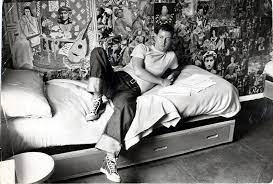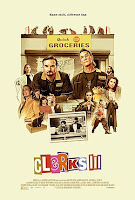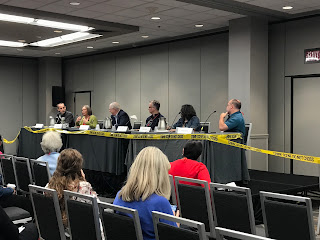 |
Book mail! Look what I got my hands on . . .
|
Award-winning author
and friend of the blog A.J. Devlin returns today with his third “Hammerhead Jed”
novel. This one take pro wrestling and ups the beat-down stakes by throwing in
some MMA. I highly recommend the whole series. Feel free to start with this
one. Here’s A.J. to tell us more about it. - Claire
It’s an honour and
a thrill to be back on DoSomeDamage.com for a third time – promoting a third
book – thanks to the talented and generous Claire Booth!
Every time I
contact my south-of-the-border author friend she always has an open mind and a
great sense of humour, regardless of whether I’m pitching her potential ideas
about discussing indie pro-wrestling, kidnapped snakes, roller derby action,
competitive wiener dog racing, or banana milkshakes … lots and lots of banana
milkshakes.
However, when I
told Claire the next chapter in the “Hammerhead” Jed pro-wrestler PI
mystery-comedy series was about how my grappling gumshoe and Dairy Queen
aficionado would catch a case that drew him into the tight-knit mixed martial
arts community – which ultimately leads him to encounter an exclusive and
unique no-holds-barred fight club – she seemed intrigued.
Despite my great
love for independent professional wrestling and women’s flat-track roller
derby, there’s no denying they both lean more toward being considered “fringe
sports,” whereas over the last twenty plus years MMA has absolutely exploded
into mainstream media and pop culture. However, this kind of extreme combat has
its own unique origin, and that’s where I wanted to take both my protagonist
and this particular narrative. It can be argued that some of the toughest and
most devastating fighters ever to throw down were never known by many, save for
those on the receiving end of their beatdowns, until the likes of street
fighters and real life urban legends such as Kimbo Slice began to bridge the
gap between what was whispered about and out of sight and what you can now
regularly view at a pub on a weekend the way you would a hockey or football
game.
If there is no
glamour, no pomp and circumstance, and certainly no pay outs, what drives these
fierce city warriors to fight in the first place? Is it pride? Machismo? A primal
need to be a dominant “Alpha Male?”
Or is it something
more … something deeper, perhaps, that pushes them to punish their bodies with a
guarantee of almost little-to-no fanfare? While some of these questions are
answered in my latest book, each character’s reasons for finding themselves in such
a predicament and environment are wholly different and distinctive, just as I
imagine they would be for the real-life fighters who served as inspiration for
this bare-knuckled backdrop of brutality.
Ultimately, what I
really wanted to achieve in Five Moves of Doom was to try and find a way
to not only provide the signature escapist action and humour I hope my series
has become known for, but also go deeper into the psyche of “Hammerhead” Jed,
all without sacrificing the tempo of what I worked hard to try and make an
engrossing and page turning story.
As a pro-wrestler
turned PI, and being the same kind of hoss ring general akin to squared circle
legends like Stone Cold Steve Austin, The Rock, and Triple H, there’s no
denying that “Hammerhead” Jed Ounstead is very much defined by his physicality
and is used to being the biggest and toughest guy on the scene.
While Jed is also certainly
clever and has his own style and guile, when conceiving of where next to take
such an affable and offbeat investigator I found myself wondering what would
happen if while working a case he found himself as more than just an underdog?
What if he was suddenly unable to not only rely on his usual brawn to get him
through the kind of tough scrapes he’s encountered so far as a sleuth, but was
also shaken to his very core and questioning who he is not just as a detective
or a skilled combatant, but also as a man?
How would this
person continue on without the advantage they had become so accustomed to?
Would they lick their wounds? Pull up their bootstraps and try again? Come up
with another strategy or change their tactics? Or would they simply through in
the towel altogether?
I believe that when
you take a character and strip them of their most essential and intrinsic
quality there is an opportunity to showcase an emotional depth that might not
often be able to be examined in generally fast-paced and fun genre fiction such
as mysteries. And I thought maybe such a development might lead to some
engaging drama that could perhaps allow me as an author to do something a
little bit different this time around with such a stalwart series lead, and, in
turn, offer something both familiar yet also fresh. By exploring these themes
in Five Moves of Doom I’m convinced for better or worse that a much more
vulnerable “Hammerhead” Jed is revealed, and, as a result, readers may find
themselves getting to know him better in this threequel than in the first two
books combined.

A.J. Devlin grew up in Greater
Vancouver before moving to Southern California where he earned a Bachelor of
Fine Arts in Screenwriting from Chapman University and a Master of Fine Arts in
Screenwriting from The American Film Institute. After working as a screenwriter
in Hollywood, he moved back home to Port Moody, BC, where he now lives with his
wife and two children.
Buy Five Moves of Doom on IndieBound or Amazon. And follow A.J. on Twitter @ajdevlinauthor.



















